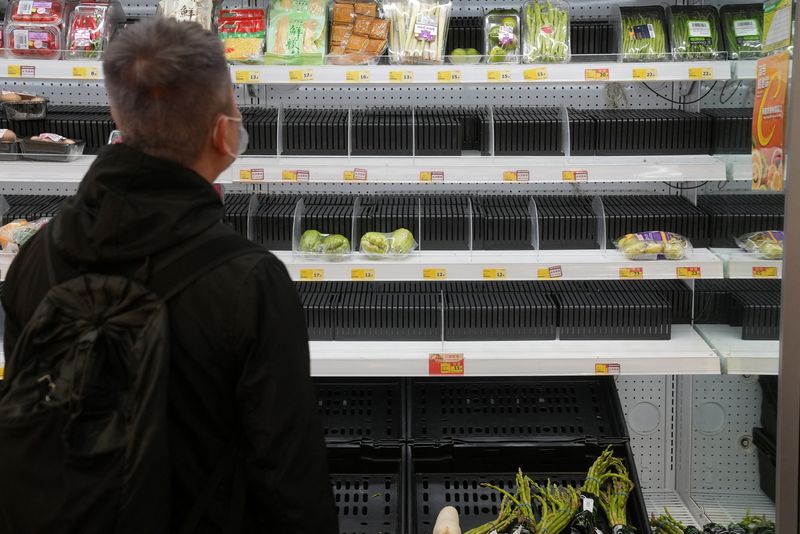By Joyce Zhou and Twinnie Siu
HONG KONG (Reuters) -Hong Kong reported 1,347 new daily COVID-19 infections on Sunday, down from the previous day's record, but the spread, with 2,000 more suspected cases, threatens the city's overstretched healthcare system, authorities said.
The surge in coronavirus cases, the biggest test yet for Hong Kong's "dynamic zero-COVID" strategy, comes a day after the government said China would help the city with testing, treatment and quarantine capacity.
Following the death of a four-year-old who had tested preliminary positive for the disease this week, the government said late on Sunday that children from the age of three would be eligible for vaccinations from Feb. 15.
Authorities also warned food supplies into the city may be disrupted, after some cross-border truck drivers tested positive for coronavirus, but said they were doing everything to get the situation back to normal "as soon as possible."
Hong Kong imports 90% of its food, with the mainland its most important source, especially for fresh food. Consumers have felt shortages of some imported goods, including premium seafood, due to stringent flight restrictions.
Health authorities in the city of 7.5 million people reported 1,347 new coronavirus infections, down from Saturday's 1,514, but they told a news conference there were about 2,000 preliminary cases. The rapid spread of the outbreak was overwhelming healthcare facilities, they said.
Local media had reported that the city would report a record 3,000 infections, including the preliminary cases.
"For those in a stable condition, please wait patiently. Please heed our appeal," said Hospital Authority official Larry Lee.
Hong Kong's No. 2 official, John Lee, said on Saturday there were no plans to lock down the city, where schools, gyms, cinemas and most other venues are closed. Social gatherings are limited to two people, restaurants close at 6 p.m. and it is rare to see anyone without a mask.
Most office employees have reverted to working from home.
Hong Kong and mainland China are among the few places in the world still aiming to suppress every COVID-19 outbreak, but the Omicron variant has proven tough to control and the spread is piling pressure on a stretched healthcare system.
Mainland measures announced on Saturday will give Hong Kong some breathing space as medical capacity is tested on all fronts, although there were no specific details of the plans and it was not clear how quickly they could be implemented.
Hospital beds for COVID patients in the global financial hub are at 90% occupancy, data from the Hospital Authority showed, while isolation facilities were nearing their maximum.
Welfare Minister Law Chi-kwong said the city will shorten the quarantine period for residents and staff of residential care homes for the elderly because they are running short of isolation beds.
Hong Kong has recorded around 24,000 infections and more than 200 deaths, far lower than other similar major cities, although medical experts warn it could see 28,000 daily infections by the end of March, with the unvaccinated elderly a particular worry.
